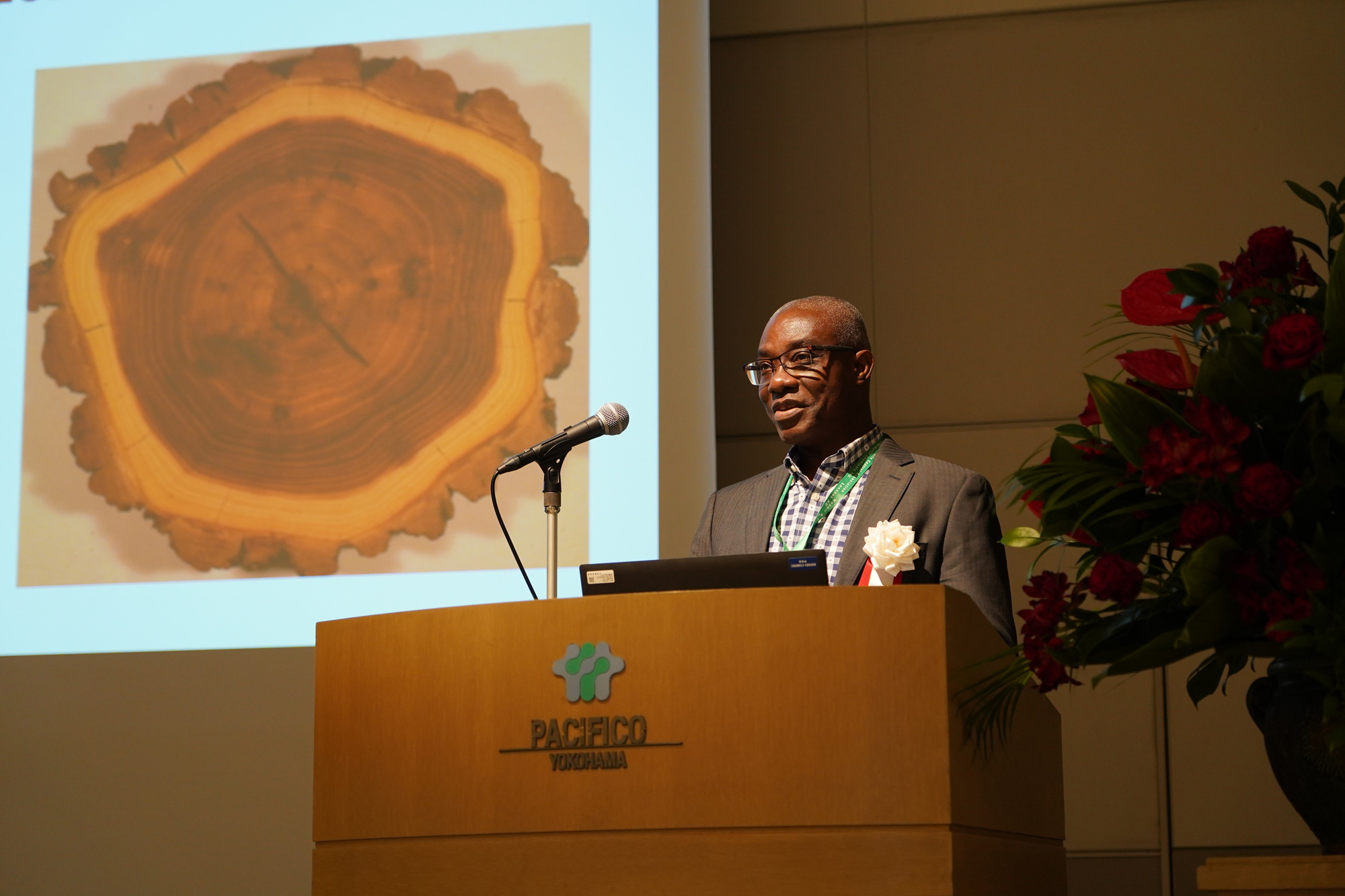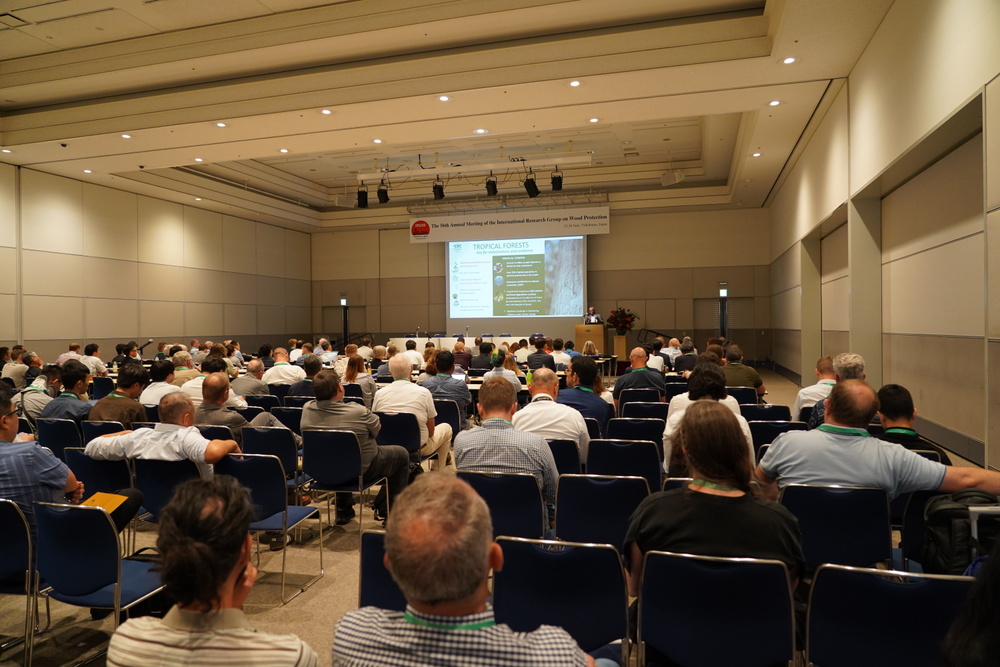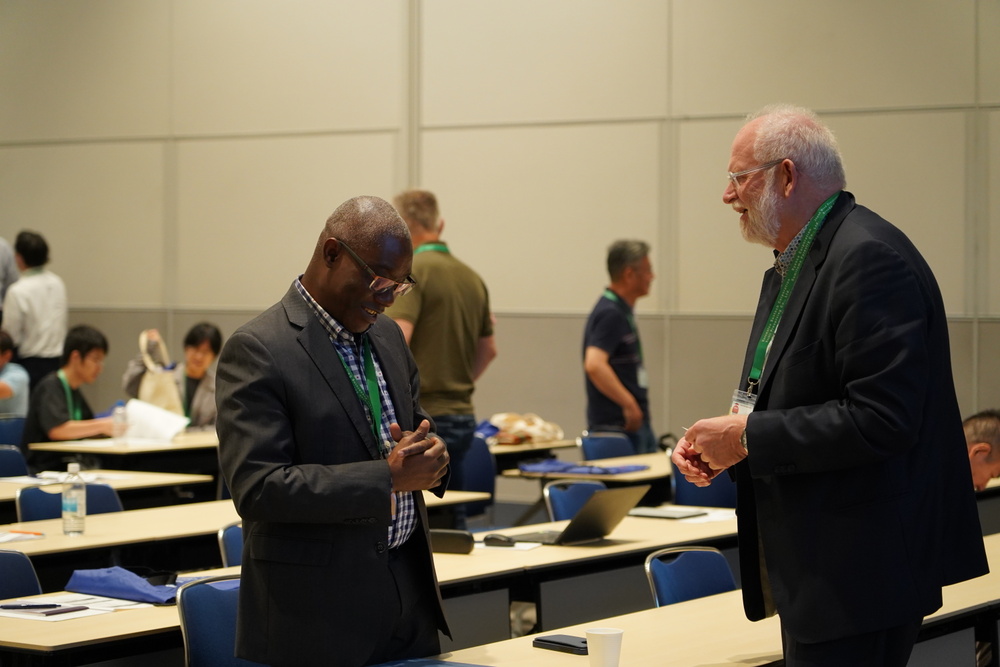ITTO highlights promise of lesser used timber, wood protection amid global trade turbulence
24 June 2025, Yokohama

Dr Mohammed Nurudeen Iddrisu, ITTO’s Director of Trade and Industry, delivers a keynote speech at the IRG56 conference in Yokohama, Japan, on 23 June 2025. Photo: Paula Sarigumba/ITTO
Lesser used tropical timber species are an opportunity for tropical countries to expand their production and trade of sustainable timber and wood products to meet market demand. Research on the durability of timber species and products supports producers in diversifying applications of tropical wood.
These were among the messages delivered by ITTO’s Director of Trade and Industry, Dr Mohammed Nurudeen Iddrisu, in a keynote speech at the IRG56 conference in Yokohama, Japan, on 22–26 June 2025.
The conference was organized by the International Research Group on Wood Protection (IRG-WP), a network of scientists and companies working on extending the life of wood products against threats such as decay, pests and fire.
In a presentation titled “Wood Protection in the Tropics: A Necessity in the Face of Climate Change and Rising Demand for Wood Products Consumption”, Dr Iddrisu first gave the expert audience an overview of ITTO and the current situation facing tropical forests and the tropical timber industry.
Tropical forests account for about 45% of all forests on Earth, occupying a total of 1.83 billion hectares. Tropical forests provide livelihoods to about 1.6 billion people while playing critical roles in carbon sequestration, carbon storage and biodiversity conservation. Yet a loss of about 10 million hectares per year persists, Dr Iddrisu pointed out, highlighting the need for sustainable forest management (SFM).
The market for tropical timber has grown strongly, mainly driven by demand from sectors such as construction in developed countries, but also by the emergence of China and the growth of the middle class in developing countries.
Adding value
While countries such as Papua New Guinea and the Solomon Islands stand out as exporters of tropical logs, Dr Iddrisu highlighted how China, Viet Nam and others have built multi-billion-dollar processing industries that add value to tropical timber exports.
“Viet Nam is a model,” Dr Iddrisu said. “With value addition, you are actually exporting less volume, but you are getting more value. That means you can provide goods and services for your people and also expand your economy.”

Regulatory challenge
Turning to current challenges, Dr Iddrisu highlighted regulations designed to prevent the import of illegally or unsustainably produced timber into developed markets, especially the European Union.
While Indonesia, a major player in the tropical timber trade issued the first FLEGT-licensed timber in November 2016, countries like Ghana has been working for years on timber legality and tracking systems to secure its FLEGT license to export timber to the European Union. The new EU Deforestation Regulation (EUDR) has somewhat “shifted the goalposts and will pose a challenge for the African continent,” he noted.
Today’s intensified geopolitics are clouding the outlook for the global tropical timber trade. On the one hand, there is unrest and ongoing conflict in Eastern Europe and the Middle East; on the other, protectionist trade policies, which place tariffs on many imports into critical markets pose trade problems for many ITTO member countries.
“Many ITTO producer members are trying to see what they can do to be able to stay afloat, continue to produce, export, generate income, and meet the needs of their forests and people,” Dr Iddrisu said.
The troubled housing construction market in China, the world’s biggest importer of tropical hardwood, is another worry for exporters, he added.
To help members meet these challenges, Dr Iddrisu explained that ITTO develops policy guidelines to encourage SFM and sustainable tropical timber industries and has funded more than 1,200 projects and activities, many in the field, to help them implement related policies and practices.
The Organization also collates and disseminates data to inform on trade and policies on tropical timber, and supports members through capacity-building in sustainable tropical forestry and trade.
“We are looking towards the future for tropical forests, and we think that maintaining timber flow without deforestation is the best way to go,” he said.

Diversifying timber species
Dr Iddrisu pointed out that only a fraction of the tree species found in highly diverse tropical forests are currently exported as timber, and that lesser-used species have the potential to add to production, supporting species diversification and without compromising sustainability.
“If you add value to these lesser used species, some of them may have similar properties to the commercialized ones, so we are working on expanding and broadening the base of species use,” he said.
Dr Iddrisu suggested that the expertise of the IRG-WP in investigating the characteristics of different types of wood, enhancing its protection, and thus promoting the efficient use of timber, could support SFM.
“I believe this is where ITTO and (the IRG-WP) can establish some form of collaboration,” he said.
“ITTO values open collaboration in research and seeks to bridge science with real-world outcomes”, said ITTO Executive Director Sheam Satkuru. “We are proactive in seeking potential partnerships with research entities, like IRG-WP members, to help turn knowledge into concrete actions for sustainable tropical forest management and legal trade.”